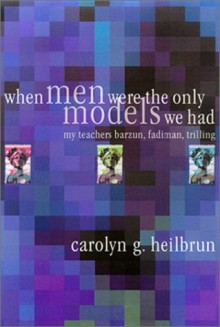"Once upon a time there were three men who exemplified, without knowing it, my ideal in life. All of them became famous as writers, influential thinkers, and public figures. Their names are Clifton Fadiman, Lionel Trilling, and Jacques Barzun. They met in college, they remained aware of one...
show more
"Once upon a time there were three men who exemplified, without knowing it, my ideal in life. All of them became famous as writers, influential thinkers, and public figures. Their names are Clifton Fadiman, Lionel Trilling, and Jacques Barzun. They met in college, they remained aware of one another as friends or, if less than friends, companions and fellow crusaders on behalf of similar ideals. Although one of them never knew of my existence, the second ignored it, and the third treated me with formal kindness, without them I would have had no concrete model in my youth of what I wanted to become. Theirs was the universe in which I wished to have my being."With these words, Carolyn Heilbrun begins a personal, pointed, and surprisingly moving account of how a woman, destined to become one of the leading feminist critics of her day as well as one of our most popular mystery novelists, found the models for the life she aspired to in men who neither imagined nor countenanced women as their equals or colleagues. Remembering these three figures as they were when she hung upon their printed words and professorial presences, reappraising them now half a century later, Heilbrun vividly evokes what these remarkable individuals had to offer to an admiring young woman who could not acknowledge—and later would not accept—the impossibility of following in their paths. In the admired anthologies, magazine articles, and introductions through which Fadiman transmitted the world of high culture to an educated general public, he indicated no devotion to questions of female destiny; yet long before Heilbrun could imagine the life in the academy that was denied to Fadiman but would eventually be hers, his was the career to which she privately aspired. Later, in her days as a graduate student at Columbia, it was Trilling who would have the most powerful intellectual effect upon her, formulating as he did the tensions inherent in the desire to salvage what was of worth from a sad, almost moribund culture, even if he frankly admitted to no interest in teaching women or in considering their destinies beyond the domestic sphere. Only the courtly Barzun, also a mentor at Columbia, seemed capable of respecting female accomplishment and eschewing stereotyped views of women. Yet together, all three men unconsciously made Heilbrun's life as a feminist possible, by representing both what she wished to join and what she needed to struggle against.When Men Were the Only Models We Had is a loving, admiring, but stringent account of youthful enthusiasms, of the romance of ideas, of the intellectual brilliance of three unwitting mentors, and of the hopelessness of female ambition in the years before the feminist movement of the last three decades of the last century. And it is, in the end, a book that offers splendid proof that the models we once had are no longer the only ones before us.
show less

